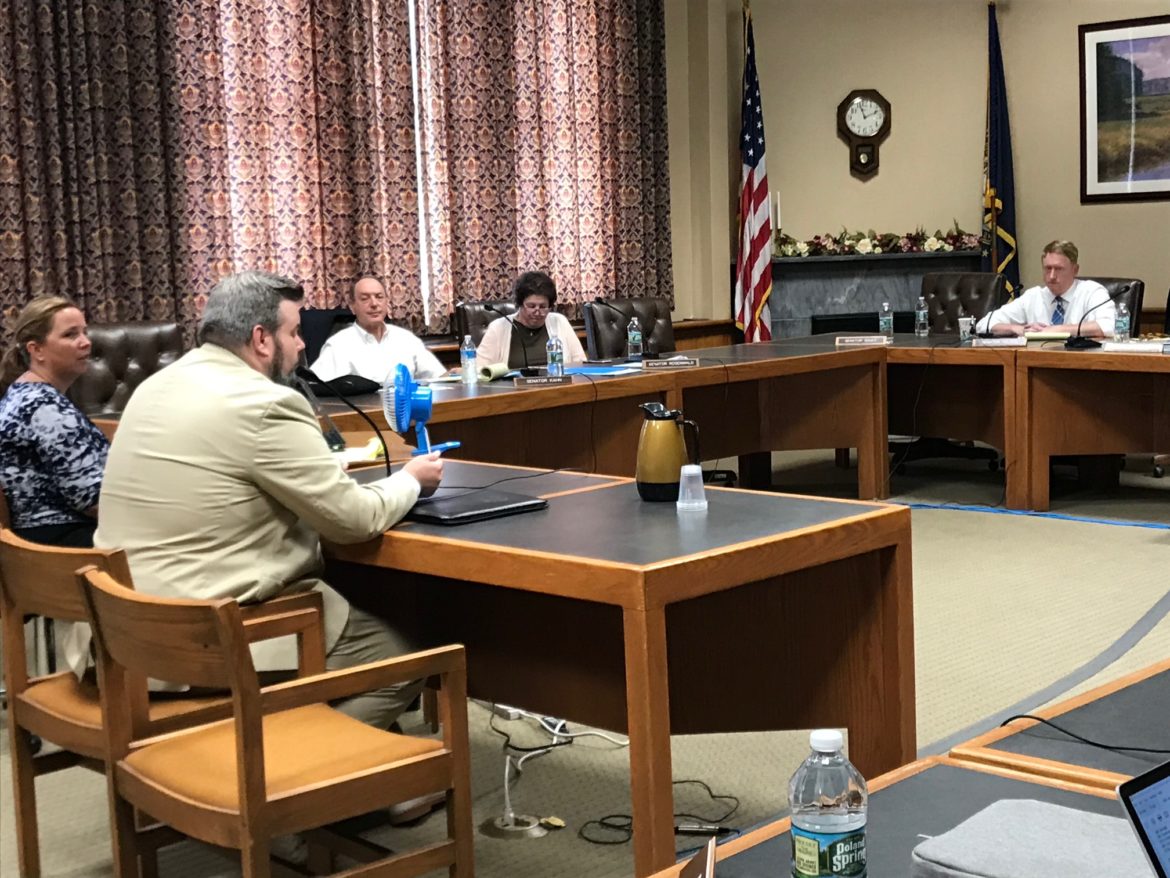By GARRY RAYNO, InDepthNH.org
CONCORD — The small Office of the Child Advocate was promised two new positions in the two-year, $13.3 billion operating budget vetoed by Gov. Chris Sununu.
Those positions were critical to the office workload to fulfill its mission, said Associate Director and Counsel Emily Lawrence. Without them, reports and investigations of systemic issues within the child protection agency are delayed.
Lawrence said her agency has had to make adjustments for research, travel and attending hearings to continue operations on the funding provided under the continuing resolution of one-quarter of authorized 2019 fiscal year funding.
She said her agency had 123 new cases in July, including 26 complaints and 97 incidents. The office closed 83 cases last month, but still has 159 pending, she said.
Lawrence testified before an ad hoc committee of Democratic House and Senate finance committee members Tuesday at one of three hearings scheduled to discuss the effects of the governor’s budget veto.
Other state agencies said they have cut back on travel, delayed payments and put new programs on hold as they wait for the budget impasse to be resolved between the governor and House and Senate leadership although no new negotiations are scheduled until late this month after meeting last week.
Clean Water Aid
The Department of Environmental Services said they may have to pro rate the state’s share of clean water grants to cities and towns or delay payment unless the fiscal committee approves its request for emergency funding so the state could pay its share.
Sen. Dan Feltes, D-Concord, wondered if the clean water grants were an emergency, why isn’t PFA (perfluoroalkyl) contamination in drinking water. The vetoed money contained funds for PFA remediation and testing.
Department of Environmental Services Commissioner Bob Scott said the PFA contamination is not considered an emergency at this time. “We are taking steps to move forward,” Scott said.
Municipal Concerns
Claremont Mayor Charlene Lovett said her city bids construction projects in September to receive a better price, but many have to rebid the work if a budget is not in place by that time.
“We have $30 million in deferred projects we cannot address alone,” Lovett told the committee, “we need grants and additional state help.”
She also said the lead remediation loan program to help landlords and low-income homeowners with young children remove lead paint, is essential to her city with its older buildings.
“It is almost imperative we have the funding that was supposed to follow the 2018 legislation,” Lovett said. “We, like many municipalities across the state, depend on state aid.”
Legal Services
Legal services for children and the poor have also been impacted under the continuing resolution, said Sarah Blodgett, executive director of the Judicial Council. She said her fiscal 2019 budget was significantly higher than the authorized appropriation and that increase is tracking into the new fiscal year.
She said the funding deficiency is felt most in non-counsel and non-CASA (Court Appointed Special Advocate) services.
Without a budget, those programs will run out of money soon, Blodgett said.
The legislature included additional money for CASA to use to recruit new advocates for children, she said, but without a budget that is “all in a holding program.”
Cancelled Sessions
The child advocate’s office said it had planned to hold listening sessions around the state this summer to hear from children but has had to delay some sessions, according to Lawrence.
She said some voluntary family services are available under the continuing resolution but not to the extent they would be with an operating budget, and she said additional staffing in the budget and in Senate Bill 6 for child protection workers, is not moving forward and that is the division’s biggest systemic need.
“We have a lot to do,” Lawrence said, “we look at the system and we look at specific cases.”
Granite Shield
Department of Safety Commissioner Robert Quinn was asked if the Granite Shield program to halt opioid distribution in the state had been impacted by the budget veto.
Quinn said the state police narcotics unit is operating and moving very aggressively against opioids, but he could not speak for local law enforcement. “There are local departments that are not able to utilize these funds today,” Quinn said.
Sen. Lou D’Allesandro, D-Manchester, and the Senate Finance Committee chair, pushed to include $3 million for local funding for the Granite Shield program.
“We put in $3 million for communities, my community; without the money you can’t do the job,” D’Allesandro said. “The fact of the matter is: no budget, no money.”
Corrections Overtime
Department of Corrections Commissioner Helen Hanks told the committee her agency would ask the fiscal committee to approve $2.5 million in emergency funding to pay corrections officers overtime for the first quarter of the new fiscal year.
She told the committee her department spent about $10 million on overtime pay last fiscal year. While a Legislative Budget Assistant’s audit indicated the department needed additional corrections officers to reduce the amount of overtime, Hanks said her agency has not “moved forward on that.”
The agency has difficulty recruiting corrections officers and relies on overtime to staff the state’s prisons.
Other Actions
Under the continuing resolution funding state government for three months, other state officials said they have cut back on travel, required greater electronic communications, and juggled money within the agencies to operate under the continuing resolution’s restrictions.
One More Hearing
The final budget hearing before the ad hoc committee will be held the last week in August.
The topic will be the effects of the budget veto on education. An earlier hearing addressed the effects on Health and Human Services.
Garry Rayno may be reached at garry.rayno@yahoo.com




